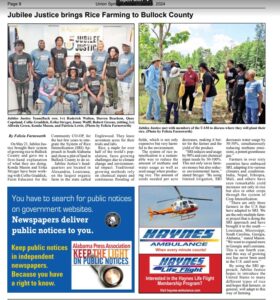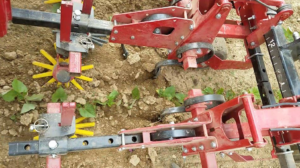Final report for FS21-333
Project Information
Cooperatives are widely recognized as a means for people to gain economic advantages they could not achieve individually. Drawing from successful examples of cooperatives in Alabama, Georgia and elsewhere, the East Alabama Black Belt Farmers’ Cooperative (EABBFC) was organized in February 2020 by 7 local farmers and the Tuskegee Bullock / Barbour Counties Alabama Extension Educator. They collectively own over 1,000 acres of land with approximately 200 tillable with 15-20 in vegetable production. Each farmer is in the process of developing their farm business plan and all the farm plans are being combined into the co-op’s business plan. Presently, they’re planting 16 different vegetables delivering to 5 grocery stores. They have intentionally limited participation in the cooperative due to the pandemic situation. As they move through and beyond the pandemic, the goal is to recruit and expand members and partnerships.
The objective of EABBFC is to increase and improve the sustainable farming practices of its members and other Black Belt farmers. The first EABBFC project is to participate in the Federation of Southern Cooperatives and Mission Alabama’s “Farm to Food Box'' Initiatives. The project involves producing 30,000 – 40,000 pounds of collards for spring 2021 distribution to food selves and other community service organizations.
The project will involve comparing 2 varieties of collards (Georgia collards and a Bonnie’s variety) using 3 different types of mulching (plastic, hay straw and pine straw) for weed control and water conservation. The demonstration will be 3 acres with 6 half-acre plots (2 varieties using 3 types of mulches). With this project the EABBFC will also explore the possibility of developing and marketing the “Black Belt” brand of greens and eventually other agricultural products.
This project addresses Sustainable Agriculture in several ways by providing training through Educational Classes and Workshops in the areas of Sustainable Fruit, Nuts and Vegetables Production, Leadership Development, Conservation and Natural Resource Management, all of which will improve the quality of life and economic well-being of the region
Develop 3-acre research and demonstration site comparing 2 varieties of collards using 3 different mulching materials.
Lead workshops on Cooperative organizational structure & business planning for our farmer to expand their leadership capacity and skills.
To develop a business plan in order to secure better financing, space, transportation and equipment which will generate more sales, income and equity for our members.
Train our growers in Farm Planning, Business Planning and In-Field Crop Growing through Workshops and One-on-One Sessions. The farmers will participate in five free workshops and five one-on-one sessions, including two pre-season business and crop planning, two in-field sessions during the growing season and one post-season evaluation.
Conduct meetings with prospective customers to determine fresh and frozen vegetable purchasing volume, specifications and pricing. Catalog and list requirements for selling to processors, buying clubs, public/private/charter schools, and other institutional buyers.
Partner with Tuskegee University to launch an aggregation & processing site and identify target markets that want to buy our value-added vegetables.
Support our farmers to apply for the USDA’s crop insurance program for produce so that they will be protected in the event of a weather or pest disaster.
Cooperators
- (Educator)
- (Educator)
- (Educator)
Research
The project involves comparing 2 varieties of collards (Georgia collards and a Bonnie’s variety) using 3 different types of mulching (plastic, hay straw and pine straw) for weed control and water conservation. The demonstration will be 3 acres with 6 half-acre plots (2 varieties using 3 types of mulches). With this project the EABBFC will also explore the possibility of developing and marketing the “Black Belt” brand of greens and eventually other agricultural products.
The Property EABBFC is leasing has a severe wild hog problem that required fencing of the property. In August 2021, EABBFC received $5,000 from the
Alabama State Association of Cooperatives for fencing and in February 2023 was awarded $200,000 from the Federation of Southern Cooperative for
equipment and additional infrastructure support.
projects.sare.org/…/EABBFC-S-SARE-GRANT-PHOTOS.pdf
2023 mulching resulted in using plastic mulch, hay and pine straw. All weeds were controlled except nutsedge. The nutsedge penetrated all three mulches. In 2024 EABBFC partnered with Jubilee Justice Rice Company to grow SRI Rice. Jubilee Justice provided a Finger Weeder cultivator that has the greatest potential in controlling the nutsedge. Because of the number of passes need for control increased the cost of fuel, labor and equipment.
Educational & Outreach Activities
Participation summary:
1. Online and Hands on training was offered to the farmers. It included farm planning, green house starts, organic growing methods, organically approved pest controls, fencing, harvest methods, nutrition benefits, food preservation, and marketing.
2. Other communities and the West Georgia Young Farmers' Cooperative was invited to share the learnings throughout the project. 3-4 workshops and field days were held.
3. Outreach through interviews with the local newspaper in Bullock County and media outlets through Alabama Cooperative Extension Systems was the strategy employed by the farmers as they choose to share lessons learned, especially to promote a broadening of entrepreneurial interest and their market opportunities.
4. Farm tours will be offered to the community at large.
5. Displays and brochures will be made available to local schools, churches, and allied agricultural and environmental organizations.
6. Sharing our results and lessons with the community and other farmer groups.
7. Our Farmers’ Cooperative have participated in strategy sessions with other local food hub initiatives to share our lessons and link up with promising aggregation and processing partners to work with.
Learning Outcomes
Raised bed production, installation and techniques.
Drip irrigation installation and techniques.
Cooperative economics and the benefits of working together.
Farm management planning and development.
Food Safety Certification
Wildlife management
Project Outcomes
This project has improved the present and future agricultural sustainability of Bullock, Barbour and surrounding counties in East Alabama and West Georgia. We have developed partnerships with the following organizations:
Bullock County Extension Services
Barbour County Extension Services
Auburn University Extension Services
Tiger Dining at Auburn University
Aramark Food Distribution Services
Alabama Department of Agriculture
Tuskegee University Extension Services
Tuskegee University Department of Agriculture
Federation of Southern Cooperatives
Alabama State Association of Cooperatives
Alabama Food System Collaborative
Alabama Agricultural Outlook Conference
Alabama Sustainable Agricultural Network
Bullock County Economic Development Corporation
Sweet Grown Alabama
Alabama Food Bank
The Common Market
Southeast Alabama Farmers Collaborative
Auburn University Vegetable Crop Field Day
Tuskegee University Annual Farmers Conference
Alabama A&M Annual Farmers Conference

